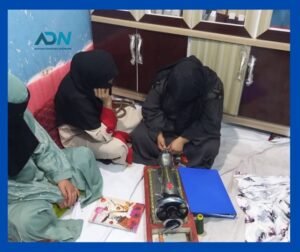Baloch-Afghan Solidarity Amid Pakistan’s Aggression

Balochistan: Save Humanity Photo courtesy of @BalochistanHumanRightsCouncil for ADN
By Rahmatullah Achakzai
In the wake of Pakistan’s recent airstrikes on Kabul and Kandahar, voices of solidarity are emerging from unexpected quarters, including from Baloch pro-independence leader Hyrbyair Marri.
In a recent post on X, Marri reminded both Afghans and Baloch of their centuries-old bond of mutual respect and support, describing Pakistan’s attack as an act that “only benefits Pakistan, a puppet of the British Empire.”
Pakistan’s airstrikes are part of a broader pattern of aggression that has escalated in recent days following cross-border clashes near Spin Boldak and Chaman. The strikes targeted areas in Kabul and Kandahar, causing panic among civilians and prompting Taliban military responses.
While Islamabad claims these actions were aimed at militant targets, many Afghans view them as a violation of sovereignty and an attempt to exert political leverage over the Taliban government.
The strikes reflect Pakistan’s longstanding use of military and economic pressure to influence Afghanistan, including repeated interference in border disputes and manipulation of strategic trade routes.
Marri’s statement highlights a shared history that predates Pakistan’s creation in 1947. He recalls how the Baloch and Afghans have consistently stood by one another: from the wars against Persian occupation to their struggles across the subcontinent. This historic kinship, he argues, remains intact despite political boundaries imposed by colonial powers.
Crucially, Marri rejects the legitimacy of the Durand Line, calling it a “so-called border” drawn by the British and recognized by neither the Baloch nor the Afghans.
His rejection echoes sentiments widely held across Afghanistan, where the Durand Line remains one of the most contentious issues in regional geopolitics.
Marri also criticizes Islamabad’s manipulation of the transit trade route, which runs through Balochistan and serves as Afghanistan’s lifeline to the sea. He accuses Pakistan of using this route as political leverage during disputes, while assuring that an independent Balochistan would prioritize peaceful dialogue and fair access.
His message underscores a deeper political alignment, one rooted in shared suffering under Pakistani centralization and military domination.
As Pakistan faces growing unrest in Balochistan and escalating hostilities with the Taliban, Marri’s words resonate as both a historical reminder and a political warning.
Solidarity between Afghans and Baloch could become a new axis of resistance against what many view as Punjabi militarism and neo-colonial control.
Rahmatullah Achakzai is a journalist based in Balochistan, covering human rights, regional politics, and cross-border issues.
Note: The contents of the article are of sole responsibility of the author. Afghan Diaspora Network will not be responsible for any inaccurate or incorrect statement in the articles.






